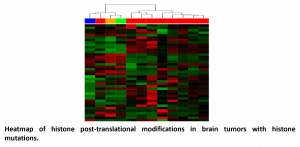Proteoform Analysis in Pediatric Glioma
In collaboration with:
Description: Brain tumors are the most common solid cancer in children. Approximately 20% of pediatric brain tumors are a subtype known as diffuse midline glioma (DMG), a high-grade malignancy arising in the thalamus or brainstem in young children. The infiltrative nature and anatomic location of these tumors preclude surgical resection, while chemotherapy and radiation have no effect on clinical outcome. As a result, DMG persists as the deadliest cancer in children with a median survival of twelve months, and five-year survival less than 5%. Access to tumor tissue for molecular analysis is very limited, but recent analysis of small biopsy specimens revealed mutations in histone H3 protein isoforms H3.1 and H3.3 in over 80% of DMGs. Importantly, H3 mutant DMGs exhibit distinct patterns of DNA methylation, histone post-translational modifications (PTMs), and gene and protein expression, suggesting an epigenetic effect of the mutation on tumor biology. Current bottom-up approaches to identify combinatorial PTMs in H3.1 and H3.3 are insufficient, therefore, pediatric tumor etiology would advance greatly through top-down analysis in the NRTDP. Integrated characterization of tumor epigenetic and top-down proteomic signatures could reveal novel and biologically relevant proteoforms, such as fusion proteins or patterns of histone PTMs, contributing to pediatric gliomagenesis that may serve as clinical biomarkers or therapeutic targets.
Project status: On going
Publications:
-Histone tail analysis reveals H3K36me2 and H4K16ac as epigenetic signatures of diffuse intrinsic pontine glioma. Shejuan An and Jeannie M Camarillo et al.
Congress Presentations:
– ASMS 2017
Spinoff funding: none






Comments are closed.